Las Patronas: The Mexican women helping migrants
- Published
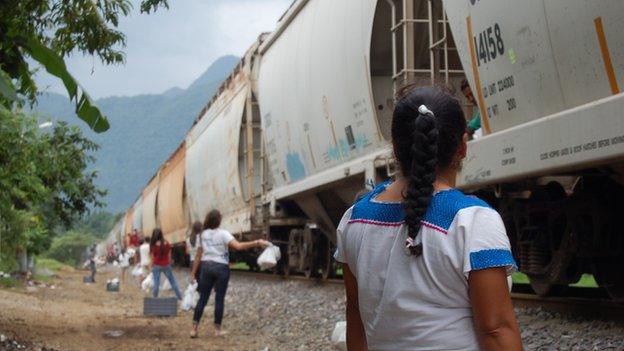
The Romero Vazquez sisters have been helping migrants for almost two decades
Nineteen years ago, the Romero Vazquez sisters were standing at the side of the railway tracks with their grocery bags, waiting to cross.
Little did they know that the approaching train would change their lives.
"We'd gone to buy bread and milk for breakfast," Norma Romero remembers, nodding towards a small yellow store on the other side of the tracks.
"As it came past, a group of people on one of the wagons shouted at us: 'Madre, we're hungry'. Then another group passed by and shouted the same thing: 'Madre, we're hungry'."
"So we threw them our bread, and then our cartons of milk."
That simple, instinctive act of kindness by the young girls was to lead to the creation of Las Patronas, a charitable organisation which has helped tens of thousands of Central American migrants over the past two decades and which was awarded Mexico's most prestigious human rights prize last year.
The village of La Patrona lies in an otherwise forgettable corner of the eastern state of Veracruz.
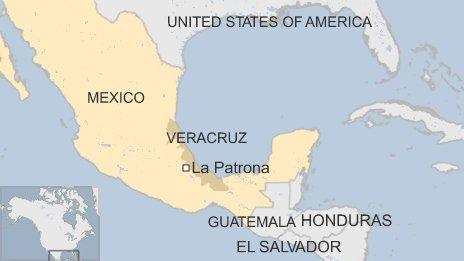
Long freight trains clatter through the village two or three times a day. Often, migrants from Honduras, Guatemala, El Salvador and Nicaragua sit on the roof of the trains heading north to the United States in search of work.
"We used to think they were just adventurous Mexicans, travelling our country for free," says Norma.
When the sisters returned home that fateful day, they expected to be punished by their mother for giving away the family's breakfast.
Life-saving rations
Instead, their mother, the formidable Dona Leonidas, helped them devise a plan. If these people needed food, she told them, the family should cook up around 30 portions of rice and beans a day, to hand out as the train thundered past.
Today, Las Patronas' bright-pink breezeblock kitchen is a hive of activity.
More than a kitchen, it is more like a small factory producing dozens of portions of that same basic meal - rice, beans and a packet of eight corn tortillas.
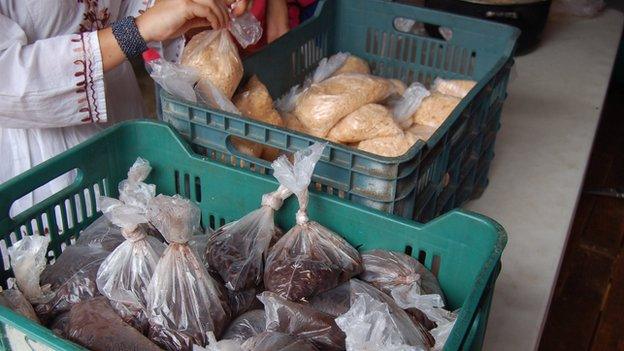
Las Patronas pack bags and bags full of rice, beans and tortillas to feed the migrants on their way to the US
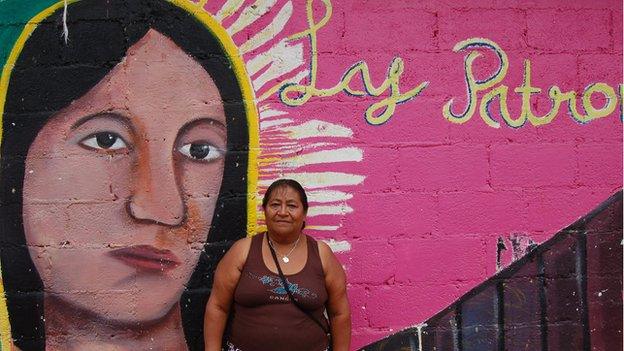
Guadalupe Gonzalez says she "never expected it to turn into something so big"
Rather than feeding just 30, now the women give out food and water to hundreds of migrants every day.
Standing over a vast pot of black beans on a wood-fired stove is Guadalupe Gonzalez, Norma's sister-in-law and fellow patrona.
Wiping her hands on her apron, she tries to sum up just why their simple idea has been so successful and well received.
"We never expected it to turn into something so big," she says. "I think it's because it came out of nowhere, it came from just the little that one can give."
It is also because, over the past two decades, it has become so vital.
As levels of poverty and violence in Central America continue to be among some of the worst in the world, ever greater numbers of migrants are heading north, travelling on the freight trains commonly known as La Bestia (The Beast).
Long journey
A few hours further south is the town of Tierrablanca, from where the cargo trains depart. Huddled in the shade on the railway sidings are small groups of migrants, resting up before the next leg of their arduous journey.
Two of them, Ricardo from Honduras and Oscar from El Salvador, are trying to get back to their families in the US after they were recently deported.
Veracruz is in the middle of a fierce turf war between two rival drug cartels, the Zetas and their one-time paymasters, the Gulf Cartel.
Ricardo and Oscar are under no illusions about the dangers they face on their trip.
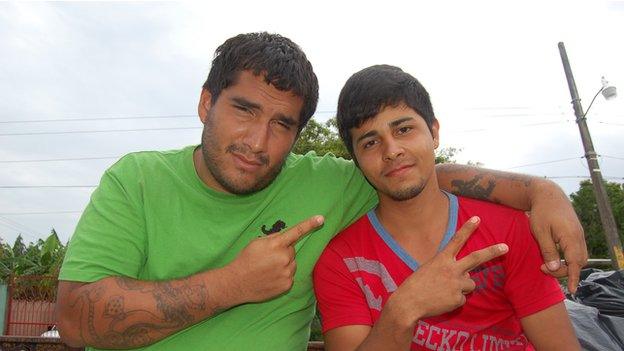
Ricardo and Oscar are well aware of the dangers of migrating north on the train
"They kidnap you, they trade in people, they trade in organs," says Ricardo of the cartels.
"If you've got some money on the train, they steal and rob everything that you've got," echoes his travelling companion, Oscar.
"It is really dangerous," Oscar continues. "Not only because of the gangsters, but also because of the dangers on the top of the train. A little girl fell from the roof a few days ago and was cut in two," he shudders.
Despite the extortion by the drug gangs, the hostility from the authorities, the punishing heat and torrential rains, the two men are insistent that the journey is worth the effort.
And they are aware that a friendly face lies just a little further up the tracks.
"Las Patronas? We heard about them because they help us and give us food. Things like water, drinks, some tortillas and frijoles (beans). They help you a lot with that, because sometimes you don't have any food nor any money to buy anything," says Oscar, who admits he is barely out of high school.
Back in La Patrona, the next train has come over the brow of the hill.
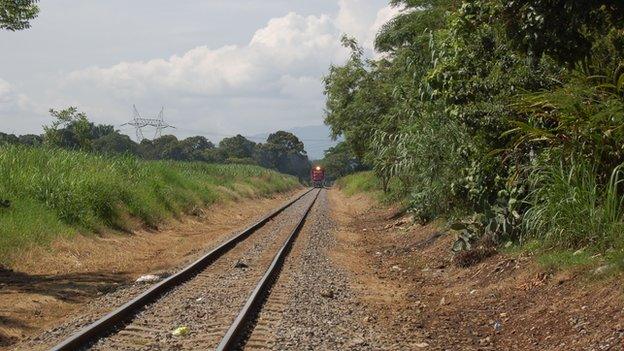
Hundreds of thousands of migrants try to migrate north every year on the train known as The Beast
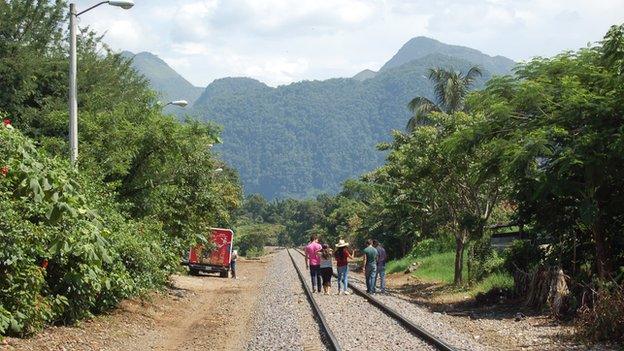
Many are injured falling off the train, others fall victim to criminal gangs
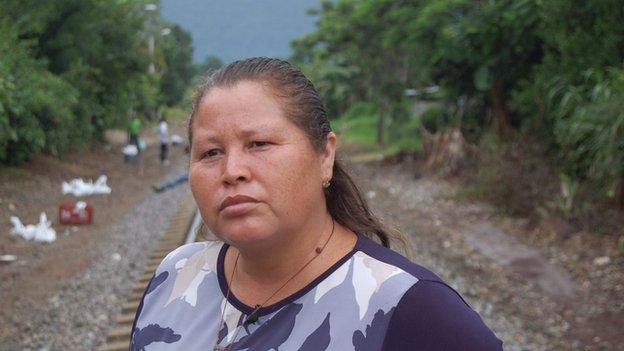
Norma Romero is a life-saver for many migrants, giving them water and food
As they have for almost 20 years, Norma Romero and a few local women wait at the sides of the tracks, bags of food and bottles of fresh drinking water in hand.
Las Patronas took their name from their village. But it has a wider religious connotation too, patrona meaning patron saint in Spanish.
For the migrants, who grab a potentially life-saving donation from a woman they may never see again, the name could not be more apt.
- Published25 August 2013
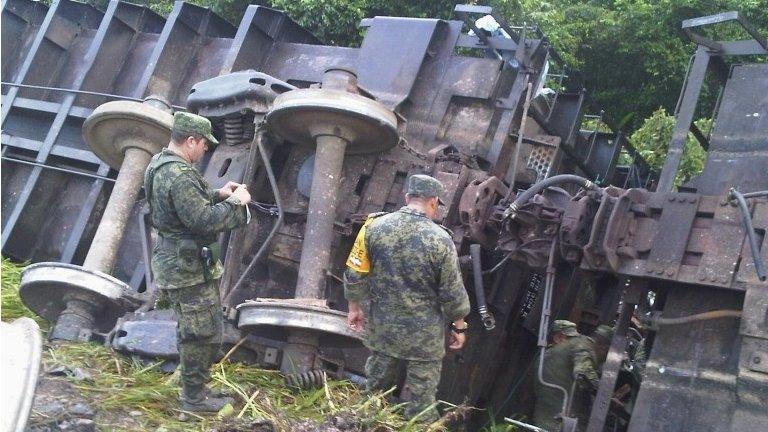
- Published14 October 2011